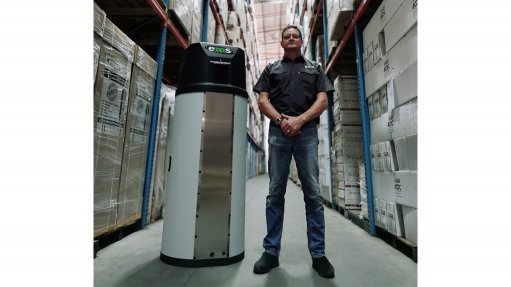
FRANCO DIEDERIKS Since the ease of the lockdown, sales are starting to pick up, especially among new developments and refurbishment projects
Krugersdorp heat pump manufacturer EMS Holdings will officially launch its world-first 200 l low-pressure, integrated heat pump alongside its official distributor, ACDC, at Electra Mining Africa 2020 Connect from September 7 to 11.
“For the first time in a long time, we have something that is uniquely indigenous to South Africa. It is a South African-engineered and -manufactured product, which contributes to job creation, especially if we expand our factory,” says EMS director Franco Diederiks.
He tells Engineering News that there is “massive demand” for the heat pump, with enquiries received from Israel, the US and the UK, driven by the product’s inherent safety.
“Hot-water systems are explosion risks. They all comprise steel containers that are under immense pressure at extreme temperatures, and if their fail-safe devices, such as temperature control valves, fail, you run the risk of a geyser exploding.”
Therefore, all hot-water systems, regardless of size, need to be certified by the South African Bureau of Standards (SABS).
The integrated heat pump does not require this certification, as it consists of a low-pressure fiberglass inner tank fitted with high-pressure stainless steel heat exchange coils. However, EMS did submit the unit to Test Africa in Pretoria to obtain SABS approval, says Diederiks.
In addition, the wireless remote-controlled 3 kW heat pump heats 200 l of water using only 750 W of electricity, compared with 4 000 W when using a traditional geyser, reducing electricity bills by between 60% and 70%. The unit is, therefore, also suitable for households wanting to go off the grid and use solar power.
If the market dictates, and Diederiks believes the US will, EMS will produce a 340 l unit. The company has also developed a 150 l unit, following an enquiry by property development company Balwin Properties for a unit to service small-scale housing projects.
The company provides larger units for the mining industry. Ranging from 300 l to 25 000 l in size, these units are typically installed at hostels and change houses at the mines. Compared with the integrated 200 l unit, the bigger heat accumulator tanks are connected to external heat pumps.
Diederiks says EMS can comfortably produce about 200 units a month of its plug-and-play 200 l unit, which costs about R25 000 a unit and, with load-shedding a common occurrence, can be run using a 5 kVA generator or inverter.
The unit is fitted with a 2 kW backup element should the heat pump fail for some unforeseen reason. Lime scale has no effect on the tanks as it works with heat transfer coils, while the unit could have a life expectancy of 15 years or more.
EMS started production of its 200 l heat pump, which has been globally patented, at the end of last year and made it commercially available in January this year.
This was followed by a roadshow to all ACDC branches across the country, after which South Africa entered lockdown.
“Since the ease of the lockdown, sales are starting to pick up, especially among new developments and refurbishment projects. By-laws stipulate that 50% of hot water must be produced by alternative energy sources such as heat pumps, gas or solar systems. Our 200 l integrated heat pump system fits perfectly within these guidelines for energy efficiency,” explains Diederiks, noting the sale of 17 units over a ten-day period last month.
He highlights that EMS faced huge challenges during the two-year development of the product. As the heat pump is a first of its kind, no mathematical equations were available to assist the company.
“But perseverance paid off and the end result speaks for itself, a world first low-pressure integrated domestic unit that will outlast and outperform all competitors in the market,” states Diederiks.